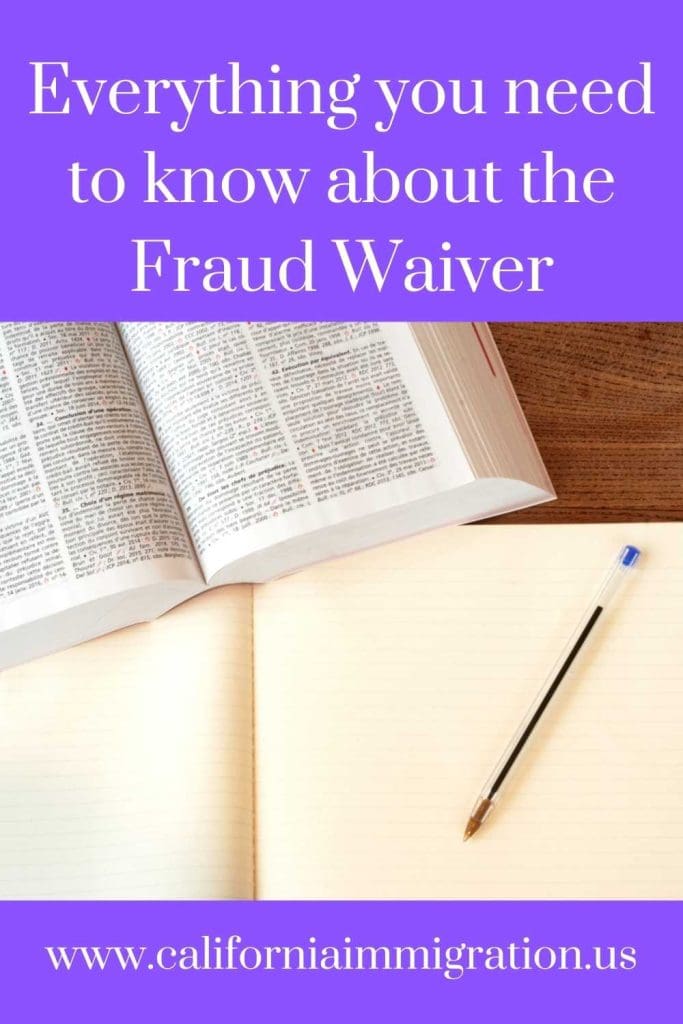Why You May Need a Marriage Fraud Immigration Waiver
To apply for a 212(i) waiver, a qualifying relative is essential. Without a waiver for misrepresentation qualifying relative, your application under section 212(i) may be denied. USCIS may find you inadmissible for misrepresentation in a marriage-based petition. Given these circumstances, an entry waiver for misrepresentation may be your only path forward. This 212(i) immigration visa allows eligible applicants to overcome a finding of fraud or willful misrepresentation under section 212(i) of the Immigration and Nationality Act (INA). It might be necessary to consider a fraud waiver for your application.
Is a Marriage immigration waiver Hard to Get?
Often, clients ask, “Is a marriage immigration waiver hard to get?” It is—unless you meet the exact criteria USCIS requires. You must present strong legal arguments and prove extreme hardship to a qualifying relative.
“Just because you committed fraud does not mean you are always inadmissible to the U.S.
— Brian D. Lerner
You can get a Waiver prepared to be able to immigrate or stay in the U.S.”
The 212(i) visa waiver qualifying relative applies to cases involving misrepresentation of a material fact. To qualify, the applicant must prove that a U.S. citizen or resident would suffer extreme hardship. Applying for a fraud waiver can help address these concerns.
It’s important to understand that hardship to the applicant’s children does not meet the requirements for a 212(i) waiver.
Under Immigration and Nationality Act (“INA”), a noncitizen who seeks to procure, has sought to procure, or procured any benefit under the INA by fraud or willful misrepresentation of a material fact, is inadmissible to the United States. To overcome this, you might seek a waiver of fraud penalties.
Citizenship and Immigration Services (“USCIS”), case law, and governmental regulations.
What class of person qualifies for the Fraud Waiver?
An applicant seeking an immigrant visa or adjustment of status based on a family based petition or a VAWA self-petitioner. An applicant seeking an immigrant visa or adjustment of status based on a employment based petition. Therefore, knowing if you fit the qualifiers for a fraud waiver is crucial.



On 15 August 1995, my wife and I got married in the Philippines. At this time, I was a permanent resident of the United States. On 18 August 1995, my wife and I immediately went to the United States where I took up my Master of Laws. In May 1996, our son was born in Connecticut. We returned to the Philippines in July 1996. My wife did not overstay as she applied for an extension which was granted. In November 1996, we unexpectedly returned to the United States to check the sudden appearance of a lump on my wife’s breast. As she had not changed her legal status on her passport, upon my advice, she represented that she was still single. The immigration at Detroit looked for me and found out she was married. Immigration allowed us to enter the United States but kept my wife’s passport. Returning to Manila, Immigration canceled the non-immigrant visa of my wife. I subsequently surrendered my greencard at the US Embassy in Manila.
Following the cancellation of my wife’s non-immigrant visa, she was subsequently granted non-immigrant visas following the submission of waivers in 1999 (1 year), 2009 (1 year) and 2018 (5 years). She traveled to the United States but on every occasion was subjected to secondary inspection. In 2017, our son, a US citizen, petitioned his mother to become a permanent resident. At this morning’s interview (September 8, 2023) at the US Embassy in Manila, my wife’s application was denied under 212(a)(6)(C)(I). The US Embassy however provided information that a waiver can be applied for violations under 212(a)(6)(C)(I). We need legal assistance in successfully filling up form I-601 and showing the denial of admission would result in “extreme hardship” to either our son or my wife. I would like to know how much are your professional fees and the time it will take to accomplish and submit the form I-601 if, in your review, it can be filed.
Thank you.
A consultation will be needed for this. It will have to be a longer paid consultation to determine the necessary facts. You can make it at blerner.timetap.com.